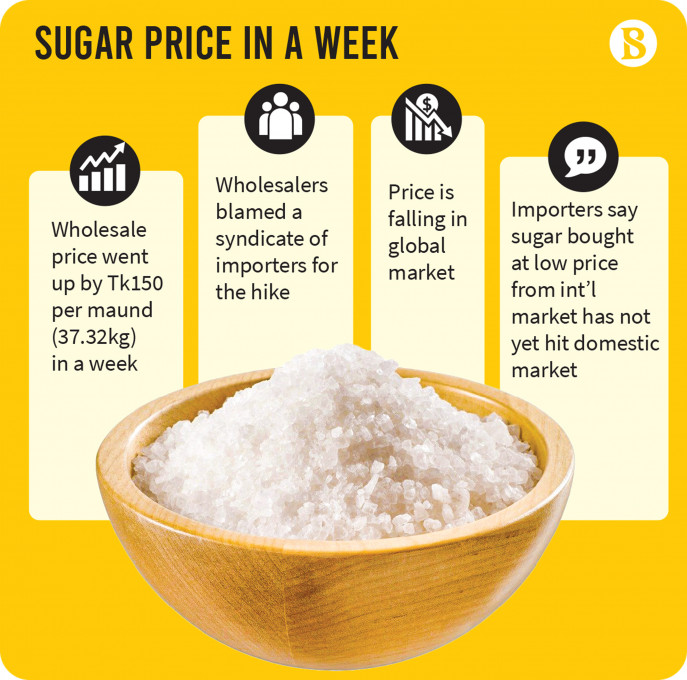Sugar prices rise despite fall in global market
The government on Thursday fixed the prices of loose sugar at Tk84 and packaged sugar at Tk89 per kg

Prices of sugar have gone up once again in the wholesale kitchen markets of Chattogram city despite a downward trend in the global market.
Over the last two weeks, the prices of this essential commodity increased by Tk150 per maund (37.32 kg) in Khatunganj, the country's largest wholesale market for consumer goods.
Traders have said although there was an upward trend in sugar prices for a few days, the price is now falling in the international market. But a syndicate of importers increased the price. The price of the product has increased by about Tk400 in the last one-and-a-half months.
The importers, however, claimed that sugar booked at lower prices in the international market has not yet hit the domestic market.
They said the whole process – bringing raw sugar from the international market, refining it and bringing it to the market – takes more than two-and-a-half months. That is why the price has not dropped in the local markets.
They also claim that the increase in the price of the US dollar and regulatory duty on sugar imports from 20% to 30% have contributed to the domestic price hike.
In Khatunganj, a maund of sugar is selling at a wholesale price of Tk3,200, which was Tk3,050 two weeks ago. The price was Tk2,750-2,800 per maund in the market in the last week of July.
Meanwhile, the Ministry of Commerce fixed the price of sugar as well as the prices of other essential commodities on Thursday.
According to the fixed price, the maximum retail price of loose sugar will be Tk84 and the maximum retail price of packaged sugar will be Tk89 from next Sunday.
At present, sugar is being sold at Tk90-95 per kg in the open market.
Abdur Razzak, owner of M/S Ismail Traders in Khatunganj, said, "Sugar is selling in the wholesale market at a higher price than the retail price set by the government. The government fixed the retail price of loose sugar at Tk84 but with Tk3,200 per maund, wholesale sugar is selling for Tk85.75 per kg."
Razzak and other sugar traders in the Khatunganj market said the government-fixed price will cause traders to lose money as they buy sugar from importers and factory owners at a higher price before selling it in the market.
City Group Executive Director (Corporate Affairs) Biswajit Saha said, "Bangladesh is in a bit of a crisis as an import-dependent country as global sugar prices were high till June. Besides, import costs have gone up due to the current appreciation of the US dollar and the reinstatement of the 10% waived duty. That is why the sugar market is seeing an uptrend."
Alamgir Parvez, owner of M/S RM Trading, a sugar importing company, said the production of sugar in Brazil, the world's main sugar producing and exporting country, has declined significantly and due to this the country has imposed some restrictions on exports.
"Moreover, owing to the global energy crisis, the trend of energy production from alternative sources has affected palm oil as well as sugar production, triggering a dearth in supply," he said.
According to Chittagong Customs House, only 17 lakh tonnes of sugar were imported through Chittagong port in the 2021-22 financial year. In comparison, 21 lakh tonnes were imported in 2020-21.
The main private refinery mills of the country are facing a supply crisis due to less import of 4 lakh tonnes of sugar in a span of a year, forcing the price to move upward.
The Bangladesh Sugar and Food Industry Corporation (BSFIC) on 6 April 2021 increased the price of per kg sugar by Tk5 to Tk75.
On 10 August 2022, the association of private mill owners wrote to the government, asking it to revise the price of sugar.
According to the mill owners, the price hike has been proposed mainly due to the increase in global market prices, dollar appreciation and withdrawal of tariff benefits. In view of that letter, the Ministry of Commerce fixed the prices of sugar on Thursday.
Currently, the demand for sugar in the country is about 18-20 lakh tonnes. Government mills used to produce one and a half to two lakh tonnes of sugar for domestic demand. However, in the last two years, production in six of the 15 government sugar mills has been halted, with production dropping to 48,000 tonnes and 25,000 tonnes, in that order.
Due to the decline in sugar production in government mills, the country's sugar sector has become almost 100% dependent on private mills.



 Keep updated, follow The Business Standard's Google news channel
Keep updated, follow The Business Standard's Google news channel
















